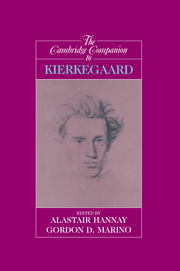Book contents
- Frontmatter
- Introduction
- 1 Out with It!
- 2 The unknown Kierkegaard
- 3 Art in an age of reflection
- 4 Kierkegaard and Hegel
- 5 Neither either nor or
- 6 Realism and antirealism in Kierkegaard's Concluding Unscientific Postscript
- 7 Existence, emotion, and virtue
- 8 Faith and the Kierkegaardian leap
- 9 Arminian edification
- 10 “Developing” Fear and Trembling
- 11 Repetition
- 12 Anxiety in The Concept of Anxiety
- 13 Kierkegaard and the variety of despair
- 14 Kierkegaard's Christian ethics
- 15 Religious dialectics and Christology
- 16 The utilitarian self and the "useless" passion of faith
- Bibliography
- Index
5 - Neither either nor or
The perils of reflexive irony
Published online by Cambridge University Press: 28 May 2006
- Frontmatter
- Introduction
- 1 Out with It!
- 2 The unknown Kierkegaard
- 3 Art in an age of reflection
- 4 Kierkegaard and Hegel
- 5 Neither either nor or
- 6 Realism and antirealism in Kierkegaard's Concluding Unscientific Postscript
- 7 Existence, emotion, and virtue
- 8 Faith and the Kierkegaardian leap
- 9 Arminian edification
- 10 “Developing” Fear and Trembling
- 11 Repetition
- 12 Anxiety in The Concept of Anxiety
- 13 Kierkegaard and the variety of despair
- 14 Kierkegaard's Christian ethics
- 15 Religious dialectics and Christology
- 16 The utilitarian self and the "useless" passion of faith
- Bibliography
- Index
Summary
Irony ranks high among Kierkegaard's enduring philosophical preoccupations. His writing career may be said to begin with his most sustained explicit treatment of the subject, his university thesis On the Concept of Irony with Continual Reference to Socrates. This was, as it turned out, far from his last word on the subject. Although he never again essayed a comprehensive theoretical account of irony, the subject recurs as a topic of discussion throughout his authorship, often accompanied by supporting references (or at least allusions) to the thesis. Even more pervasive than his remarks on irony is his employment of it, and of other varieties of verbal indirectness. Precisely how many, and which, of the utterances in Kierkegaard's texts should be taken as ironical (or in some way indirect) is a matter of considerable controversy - a controversy that has naturally intensified with the entry of poststructuralist critics onto the field of Kierkegaard interpretation. But one need not share the views of self-described postmodernists or poststructuralists to regard it as a truism that any adequate reading of Kierkegaard must confront both his announced views on irony and other modes of indirect discourse, and his highly deliberate and self-conscious employment of such modes.
- Type
- Chapter
- Information
- The Cambridge Companion to Kierkegaard , pp. 125 - 153Publisher: Cambridge University PressPrint publication year: 1997
- 7
- Cited by



